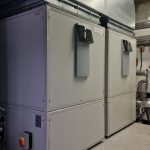Why hybrid heating systems make sense for the UK
In recent years, the government has been promoting electricity as the preferred way to heat buildings as we strive for a future with net-zero carbon emissions. One of the government’s preferred method of heating is heat pumps, which have received a lot of attention through policy proposals and grant programs.
However, heat pumps may not be the best or even a viable option for every situation. In such cases, hybrid heating systems, which combine multiple heat-generating technologies, offer a logical alternative.
The government’s stance on heating is to prioritize electricity as we transition to a low-to-net-zero carbon future. They are particularly focused on heat pumps and have proposed various policies and incentives to encourage their adoption, including grants for replacing boilers with heat pumps.
Whilst its good to see an increasing uptake of heat pumps, we are still far from reaching the government’s target of installing 600,000 units annually by 2028. Achieving this target seems increasingly unlikely, considering the rising cost of living, especially energy prices.
Even with the £5,000 Boiler Upgrade Scheme grant, installing a heat pump is still considerably more expensive than simply replacing a boiler. Additional expenses are often unavoidable since modifications need to be made to the existing heating system, as well as the addition of a storage cylinder (buffer vessel), which can amount to the same price as a gas-fired boiler.
On the international front, there have been developments in attitudes towards hybrid heating systems. In Germany, the coalition government initially opposed hybrid systems but has recently changed its position due to the crisis in Russia and Ukraine and their reliance on Russian gas. They now require that 65% of a heating system’s energy comes from a low or zero carbon source, which hybrid systems easily meet, often surpassing 65% in recent trials.
The Netherlands has also adopted a similar stance, mandating that from 2026 onwards, boiler replacements must involve the use of a heat pump, effectively making hybrid systems the norm.
We believe that the UK will observe these international developments and recognize that while heat pumps are a promising technology, they may not be suitable for all properties due to cost and space constraints. Therefore, we anticipate greater acceptance of hybrid heating systems, where an existing or new combi boiler can continue to provide hot water, while a heat pump handles the majority (around 80%) of heating duties. The boiler serves as a backup for extreme weather conditions that the heat pump may struggle with.
One significant advantage of hybrid systems is that they can usually work with existing heating setups, requiring minimal modifications. This makes them a more practical option, especially for those facing urgent heating and water issues due to a failing boiler.
Due to the way hybrid systems work and the control setup we are also able to make the best and most efficient use of a condensing boiler and a heat pump. Heat pumps reduce in efficiency when its colder whereas boilers are the same whether its hot or cold outside. This can significantly help our running costs as we can take advantage of this and only use the heat pump at its most efficient.
We believe that hybrid systems offer a favorable compromise for many home and property owners.






